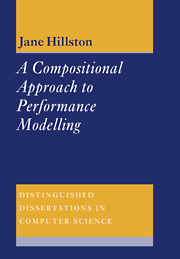Book contents
3 - Performance Evaluation Process Algebra
Published online by Cambridge University Press: 24 November 2009
Summary
Introduction
This chapter presents the Performance Evaluation Process Algebra (PEPA). This language has been developed to investigate how the compositional features of process algebra might impact upon the practice of performance modelling. Section 3.2 outlines the major design objectives for the language. Most of the rest of the chapter is taken up with the subsequent informal and formal descriptions of the language, and a description of its use as a paradigm for specifying Markov models. Some simple examples are presented to introduce the reader to the language and its use in describing systems. This establishes PEPA as a formal system description technique. Presentation of more complex examples is postponed until Chapter 4.
The use of PEPA for performance modelling is based on an underlying stochastic process. It is shown that, under the given assumptions, this stochastic process will be a continuous time Markov process. Generating this Markov process, solving it and using it to derive performance results are presented and illustrated by a simple example. The relationship between PEPA and established performance modelling paradigms is discussed in Section 3.6.
Design Objectives for PEPA
An objective when designing a process algebra suitable for performance evaluation has been to retain as many as possible of the characteristics of a process algebra whilst also incorporating features to make it suitable for specifying a stochastic process.
- Type
- Chapter
- Information
- A Compositional Approach to Performance Modelling , pp. 17 - 44Publisher: Cambridge University PressPrint publication year: 1996



